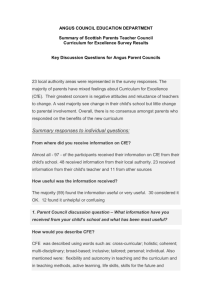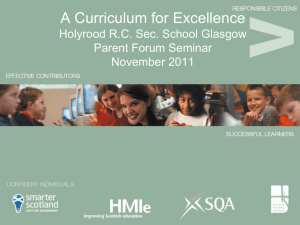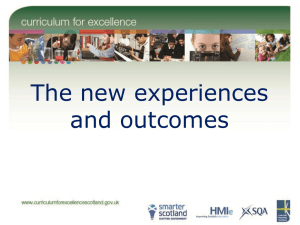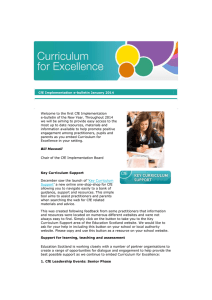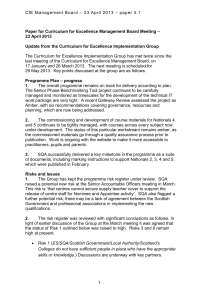Draft Curriculum for Excellence Implementation Plan 2013-14
advertisement
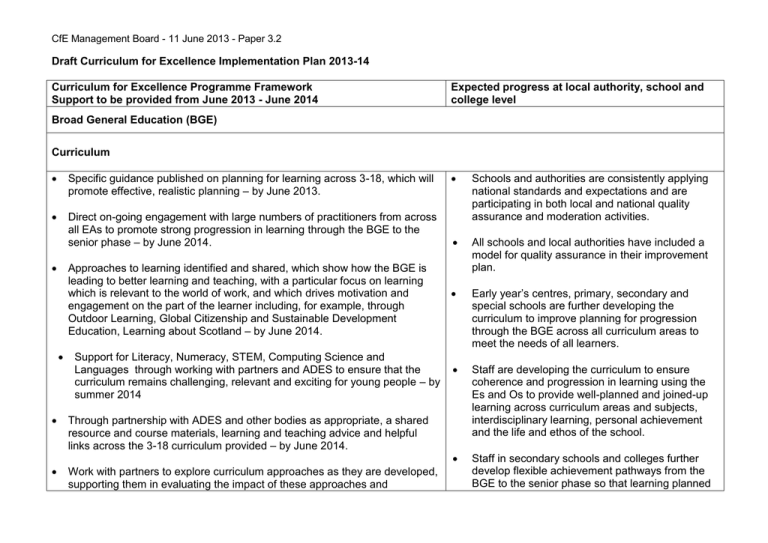
CfE Management Board - 11 June 2013 - Paper 3.2 Draft Curriculum for Excellence Implementation Plan 2013-14 Curriculum for Excellence Programme Framework Support to be provided from June 2013 - June 2014 Expected progress at local authority, school and college level Broad General Education (BGE) Curriculum Specific guidance published on planning for learning across 3-18, which will promote effective, realistic planning – by June 2013. Direct on-going engagement with large numbers of practitioners from across all EAs to promote strong progression in learning through the BGE to the senior phase – by June 2014. Approaches to learning identified and shared, which show how the BGE is leading to better learning and teaching, with a particular focus on learning which is relevant to the world of work, and which drives motivation and engagement on the part of the learner including, for example, through Outdoor Learning, Global Citizenship and Sustainable Development Education, Learning about Scotland – by June 2014. Support for Literacy, Numeracy, STEM, Computing Science and Languages through working with partners and ADES to ensure that the curriculum remains challenging, relevant and exciting for young people – by summer 2014 Through partnership with ADES and other bodies as appropriate, a shared resource and course materials, learning and teaching advice and helpful links across the 3-18 curriculum provided – by June 2014. Work with partners to explore curriculum approaches as they are developed, supporting them in evaluating the impact of these approaches and Schools and authorities are consistently applying national standards and expectations and are participating in both local and national quality assurance and moderation activities. All schools and local authorities have included a model for quality assurance in their improvement plan. Early year’s centres, primary, secondary and special schools are further developing the curriculum to improve planning for progression through the BGE across all curriculum areas to meet the needs of all learners. Staff are developing the curriculum to ensure coherence and progression in learning using the Es and Os to provide well-planned and joined-up learning across curriculum areas and subjects, interdisciplinary learning, personal achievement and the life and ethos of the school. Staff in secondary schools and colleges further develop flexible achievement pathways from the BGE to the senior phase so that learning planned CfE Management Board - 11 June 2013 - Paper 3.2 disseminate the learning – by June 2014. Advice and exemplification provided of achievement pathways from the BGE to the senior phase which show effective transition planning – by June 2014. Short life Working Group including professional associations, ADES, NPFS, ES and SG, to look at minimising bureaucracy in relation to planning and assessment procedures –to report by end November 2013 and delivered using the Es and Os can contribute directly to qualifications Staff across early year’s centres, primary, secondary and special schools collaborate in planning learning to ensure smooth transitions for learners across all curriculum areas. Secondary schools continue to evaluate and further develop the BGE from S1-S3 to ensure all young people benefit from their entitlement to a BGE. This includes appropriate specialisation and continued breadth of experience so that they can achieve as well as they can and to provide a firm foundation for progression into the senior phase. STEM Support for SSERC throughout 2013/14 to provide professional learning, and build capacity at local level to develop teacher confidence and skills in the delivery of primary science (date to be confirmed). Literacy/Numeracy Schools and local authorities ensure a correct balance between delivery, planning and reporting Skills for L/L/W more firmly embedded within young people’s learning within the BGE. Schools have planned approaches to primary science, which draw on support from partners and secondary colleagues as appropriate. Local authorities and schools have a strong understanding of the place of computing science in CfE, and teachers deliver learning in the subject which is up-to-date and relevant Improved literacy and numeracy outcomes for young people. CfE Management Board - 11 June 2013 - Paper 3.2 Further development of the literacy hubs (Literacy Action Plan) and development and online publication of the Early Literacy Appraisal & Action Resource (ELAAR) (date to be confirmed). Partnership working across local authorities, via the National Numeracy Network, to improve numeracy strategies and good practice at LA level (date to be confirmed). Continue to promote the development of skills for L/L/W through the ‘Skills in Practice’ online resource, the ‘World of Work Inter-Authority Emerging Practice Network’ and other means (date to be confirmed) . Listening and Talking Professional learning resource based on the SSLN (Literacy) report in September 2013; Further materials to be published in January and March 2014; Gaelic Medium Make available translations of key learning materials for Gaelic Medium Education 3-18 and key learning materials for Gaelic Learner Education and Looked After Gaelic Children. Learning about Scotland Network of Scots language co-ordinators to work with the Scottish Government and other key organisations to establish a vision for the national development of the Scots language within CfE (date to be confirmed). Languages 1+2 Strategic Implementation Group will work to drive forward recommendations from the Languages Working Group report. Continue to work with key Schools and local authorities are supported to promote the place of Scots language within CfE CfE Management Board - 11 June 2013 - Paper 3.2 delivery partners, Education Scotland and Scotland’s National Centre for Languages to demonstrate good examples of earlier language learning (date to be confirmed). National Languages Conference to showcase good examples and publish findings from pilot projects. More schools offering language learning from an earlier age. Local authorities are able to demonstrate progress towards the Introduction of first additional language from P1 and second additional language from P5. CfE Management Board - 11 June 2013 - Paper 3.2 Assessment Current practices in e-portfolios identified and shared – by June 2013. Current practices in profiling with a focus on 3-18 identified and shared – by December 2013. Exemplars published for whole class groups, across a whole school or associated school groups – by June 2013. Draft exemplars based on draft Assessing Progress guidance published on NAR – by June 2013. Final version of guidance on Assessing Progress and Achievement published - by December 2013. Further exemplars based on draft Assessing Progress guidance published on NAR – by December 2013. Exemplars published for associated school groups based on advice on Assessing Progress and Achievement – by June 2014. Final version of Monitoring and Tracking Progress and Achievement published - December 2013. Exemplars published of approaches to QA and moderation across and within LAs – by June 2013. Collation of resources to support practitioners in their practice in relation to QA and moderation – by September 2013. Further exemplars published of innovative approaches to QA and moderation within LAs – by March 2014. Schools further develop and embed approaches to profiling including using e-portfolios and improving the quality and impact of the P7 and S3 profiles. This involves providing a clearer focus on skills development, recognising wider achievement and using profiling to inform and improve future learning. Schools further develop realistic, manageable, approaches to assessing progress and achievement across all curriculum areas at early to 4th curriculum levels. Schools and education authorities’ priorities in improvement plans and for the professional development of staff include further development of approaches to assessing progress and achievement of levels across curriculum areas and reporting these to parents. Schools further develop approaches to monitoring and tracking learners’ progress and achievement in the BGE to provide robust evidence of standards of achievement across all curriculum areas. Schools and education authorities further develop approaches to QA and moderation in and across school/centres/colleges and within and across education authorities to build staff confidence in using, sharing and developing good practice in assessment. CfE Management Board - 11 June 2013 - Paper 3.2 Further exemplars published of approaches to QA and moderation across LAs – by June 2014. Phase one of Literacy learning and teaching materials published following publication of SSLN (Literacy) report – by September 2013. Phase two of SSLN (Literacy) learning and teaching materials published by – January 2014. Phase 3 of SSLN (Literacy) learning and teaching materials published – by March 2014. Initial numeracy learning and teaching materials developed and published following publication of SSLN (Numeracy) report – by April 2014. Make available Gaelic versions of assessment materials for Gaelic Medium and Gaelic Learner Education. This will include the National Assessment Resource and further exemplification on Professional learning resource: Assessing progress and achievement in Gàidhlig and Gaelic (Learners) Learning and teaching of literacy and numeracy is reviewed and updated in light of the SSLN (Literacy and Numeracy) priority findings and new materials. CfE Management Board - 11 June 2013 - Paper 3.2 Parents Support NPFS in the delivery of Nationals in a Nutshell series for parents – by June 2013. Further CfE briefings produced which educational establishments can use directly with parents to help them understand and support their child’s learning – by June 2014. Parental and carer engagement focuses on developments in profiling and assessment, supporting informed choices to provide the entitlement to a BGE to the end of S3, and changes in the senior phase. Parent Councils are involved in improvement and curriculum planning. Schools and early year’s centres continue to develop approaches to involving parents and carers in supporting all children in their learning. Support staff to be more confident in making assessments. Collate current assessment information on transition in each local authority. Parent groups involved in on-going programme of ‘conversations’ which will focus on key aspects of CfE – by June 2014. CfE Briefing focused on Parental Involvement (date to be confirmed) New CfE Leaflet for parents to help them understand the “story” of CfE and different types of learner journey – by end August 2013 Illustrations of different learner journey pathways, particularly illustrating routes through the Senior Phase available on parentzone – by Summer 2013 Development of parentzone website with particular focus on improving information to parents, including use of video clips and young people’s voices – by summer 2014 Further Support for Local Authorities in further developing CfE information for parents in their School Handbooks – by summer 2014 Support staff to be more confident in making assessments. Collate current assessment information on transition in each local authority. Parents know where to go to access the information they need on CfE, including on the new Qualifications, at school, local and national level CfE Management Board - 11 June 2013 - Paper 3.2 Curriculum for Excellence Programme Framework Support to be provided from June 2013 – June 2014 Progress at local authority, school and college level Senior Phase Specific guidance published on planning for learning across 3-18 which will promote effective, realistic, planning – by June 2013. Agree an implementation plan with the seven pilot local authorities to help facilitate the smooth delivery of the Local Partnership Agreements. Specific objectives will be detailed in the Local Partnership Agreements, which will then be reviewed and measured at given points in the year –by July 2013. Direct on-going engagement with large numbers of practitioners from across all EAs to promote strong progression in learning through the BGE to the senior phase – by June 2014. Approaches to learning identified and shared which show how the senior phase is leading to better learning and teaching, with a particular focus on learning which drives motivation on the part of the learner including, for example, through Outdoor Learning, Global Citizenship and Sustainable Development Education – by June 2014. Through partnership with ADES and other bodies as appropriate, a shared resource and course materials, learning and teaching advice and helpful links across the 3-18 curriculum provided – by June 2014. Work with partners to explore curriculum approaches as they are developed, supporting them in evaluating the impact of these approaches and disseminate the learning – by June 2014. Advice and exemplification provided of achievement pathways from the BGE to the senior phase which show effective transition planning – by June 2014. Secondary schools and colleges are further developing the senior phase to: o build on achievements in the BGE; o take advantage of local flexibilities in delivering the senior phase entitlements; o provide a range of flexible progression pathways within and beyond the senior phase to meet the needs of all learners; o promote the highest level of attainment in literacy and numeracy for all; o meet the needs of young people who leave school at the end of S4; o build on college partnerships; o promote and support employability skills, skills for learning, life and work; and o take account of the transition and interim arrangements for the period of dual running of existing and new qualifications. Secondary schools have a clear rationale for the number of subjects/qualifications individuals and groups of learners study throughout the senior phase, which takes account of partnerships with the education authority and other providers and views of parents and carers CfE Management Board - 11 June 2013 - Paper 3.2 Professional learning programmes agreed with education authorities – by September 2013. A support programme planned, developed and implemented for university and college teachers and lecturers to engage with CfE and secondary schools – first phase complete April 2014. Youth work strategy refreshed and shared with Scottish Government and partners for further consultation – by September 2013. Support provided to CLD practitioners working with Adult Learners and S4S6 on recognising wider achievement – by March 2014. Progression routes are increasingly informed by tracking and profiling of learners’ progress through the BGE and senior phase so that the senior phase curriculum is under review and evolving to better meet learners’ needs Staff have planned opportunities to collaborate across schools and with partners (including college and CLD) to share resources and evolving practice in the senior phase and to broaden pathways and achievement. Staff across secondary schools, colleges and CLD will work with young people and adult learners in the senior phase on recognising achievement. Secondary schools have a clear understanding of university entrance requirements and have signposted these to parents. Local authorities and secondary schools to work with local employers to ensure that they have an understanding of the new qualifications and the wider achievements and skills that learners emerging from school will have following 2013/14. Identify and embed other qualifications that support CfE – NPAs, NCs, Youth work, Achievement Award and SCQF credit rated programmes - by June 2014. CfE Management Board - 11 June 2013 - Paper 3.2 STEM BCS Chartered Institute for IT co-ordinate programme of professional learning for those teaching computing science, both in the early years of secondary and in support of the new national qualifications (date to be confirmed). Local authorities and schools have a strong understanding of the place of computing science in CfE, and teachers deliver learning in the subject which is up-to-date and relevant Literacy and Numeracy Further development of the literacy hubs (Literacy Action Plan) and development and online publication of the Early Literacy Appraisal & Action Resource (ELAAR) (date to be confirmed). Partnership working across local authorities, via the National Numeracy Network, to improve numeracy strategies and good practice at LA level (date to be confirmed). Continue to promote the development of skills for L/L/W through the ‘Skills in Practice’ online resource, the ‘World of Work Inter-Authority Emerging Practice Network’ and other means. (June 2014). Improved literacy and numeracy outcomes for young people. Schools and local authorities are supported to promote the place of Scots language within CfE Local authorities are able to demonstrate progress towards the Introduction of first additional language from P1 and second additional language from P5. Learning about Scotland Network of Scots language co-ordinators to work with the Scottish Government and other key organisations to establish a vision for the national development of the Scots language within CfE (date to be confirmed). Languages 1+2 Strategic Implementation Group will work to drive forward recommendations from the Languages Working Group report, meeting three times during 2013/14. Continue to work with key delivery partners, Education Scotland and Scotland’s National Centre for Languages to demonstrate good CfE Management Board - 11 June 2013 - Paper 3.2 examples of earlier language learning (date to be confirmed). National Languages Conference to showcase good examples and publish findings from pilot projects. Senior Phase Benchmarking Tool On-going awareness raising of the Senior Phase Benchmarking Tool - by June 2013 - June 2014. Early Adopter edition of the Senior Phase Benchmarking Tool released – by June 2013. Preview edition of the Senior Phase Benchmarking Tool released – by September 2013. Communications in relation to the Senior Phase Benchmarking Tool and resource pack made available – by September 2013 and between January and March 2014. Preview update version of the Senior Phase Benchmarking Tool available between January and March 2014. Publication of Senior Phase Benchmarking Tool case studies developed from work with Early Adopters and others – from September 2013 – June 2014. Briefing publications and notifications for Senior Phase Benchmarking Tool from June 2013 – June 2014. National support undertaken for Senior Phase Benchmarking Tool in advance of the live version in August 2014 - from October 2013 – December 2014. Staffs in local authorities, secondary schools and national education agencies become familiar with the purpose of the Senior Phase Benchmarking Tool, including the 4 national measures and other features that it provides. Local authorities and secondary schools should work with local employers to ensure that they have an understanding of the new qualifications and the wider achievements and skills that learners emerging from schools will at the end of the 2013/14 academic session. CfE Management Board - 11 June 2013 - Paper 3.2 Curriculum for Excellence Programme Framework Support to be provided from June 2013 – June 2014 Qualifications – development and support Awards Publication of third release of Assessment Support Materials for CfE Awards on SQA secure site - by June 2013. Case studies about the new CfE Awards published on SQA website - by August 2013. All Gaelic medium materials published for Project Unit (new Scottish Studies Award) – by October 2013. National 1–5 Updated Course Assessment Specifications and other mandatory documents as appropriate in light of assessment development for National 2, 3, 4 and 5 qualifications revised/published on SQA website – by June 2013. Unit Support Notes for new National 1 Units (phase 1) published on SQA website – by August 2013. Formative questions for each Lifeskills Maths Unit at National 3, 4 and 5 published on Open Assess (phase 2) – by August 2013. Live questions for each Lifeskills Maths Unit at National 3, 4 and 5 published on SOLAR (phase 2) – by August 2013. Unit Specifications and Unit Support Notes for new National 1 Units (phase CfE Management Board - 11 June 2013 - Paper 3.2 2) published on SQA website – by February 2014. Unit Specifications and Unit Support Notes for New National 1 Units (phase 3) published on SQA website – by May 2014. Higher Assessment Overviews for new Higher qualifications published on SQA website – by June 2013. Unit Assessment Support for new Higher qualifications (package 1) published – by October 2013. New National Qualifications Subject Implementation Events (Higher) start (approx. 140 events) - from November 2013 to March 2014. Specimen Question Paper including Marking Instructions for new Higher qualifications published on SQA website – by February 2014. Unit Assessment Support for new Higher qualifications (package 2) published – by February 2014. New National Qualifications Subject Implementation Events (Higher) complete (approx 140 events) from November 2013 to March 2014. Coursework information including Marking Instructions for new Higher qualifications published on SQA website – by March 2014. Unit Assessment Support for new Higher qualifications (package 3) published – by April 2014. HE engagement (information) curriculum (Higher and Advanced Higher for HE faculty staff (4 events) – April 2014. Registrations submitted on SQA’s Events Booking System (EBS) by end of October. CfE Management Board - 11 June 2013 - Paper 3.2 HE engagement (information) conference (Senior Phase curriculum and qualifications) for UK-wide university admissions staff (1 event) – June 2014. Updated Course Assessment Specifications and other mandatory documents as appropriate in light of assessment development for new Higher Qualifications published on SQA website – by June 2014. Professional focus papers published for new Advanced Higher. SSLN Scottish Survey of Literacy and Numeracy 2013 survey complete – by December 2013. Qualifications - Implementation 2013-14 Publication of 2014 examination timetable – by June 2013. Deadline for centres seeking approval to offer National Courses at National 4 and 5 for 2014 – by September 2013. QA of internal assessment — centres to receive notification of National 1–5 selections for first round November/December verification – by October 2013 Receipt of entries for National Qualifications for August 2014 certification from schools – by November 2013. Centres to ensure they are approved to offer all National Qualifications for which they intend to enter candidates in 2013/14. Centres to ensure they have materials collated and packaged ready for uplift on 24 October. Schools to ensure they have submitted initial entries for National Qualifications (Courses and Units) by 8 November and take action on subsequent Entries Eligibility Report; sign off Entry Profile Summary Report. CfE Management Board - 11 June 2013 - Paper 3.2 QA of internal assessment — centres to receive notification of National 1–5 selections for second round February verification – by December 2013. Centres to ensure they have materials collated and packaged ready for uplift on 15 January. Receipt of entries for National Qualifications for August 2014 certification from colleges – by January 2014. Colleges to ensure they have submitted initial entries for National Qualifications (Courses and Units) by 31 January. Visiting examination period – from February – by May 2014. Centres to ensure they have materials collated and packaged ready for uplift on 28 April. Centres to ensure they have Coursework packaged and ready for uplift on 25 March. Art and Design to be uplifted on 30 April. QA of internal assessment — centres to receive notification of National 1–5 selections for third round May verification – by March 2014. Uplift of externally assessed Coursework for all National 5 subjects with a timetabled exam (except Art and Design) – by March 2014. Deadline for submission of entries; changes of level and withdrawals to avoid/prior to late charges being applied – by March 2014. Centres to take appropriate action to ensure entries are accurate as at 31 March. Uplift of externally assessed coursework for all National 5 subjects that have coursework components only – by April 2014. Centres to ensure they have Coursework packaged and ready for uplift on 24 April. Submission of estimates for all National Courses – by April 2014. Centres to submit estimates to SQA by 28 April. Examination period from 29 April to 6 June 2014. Centres to submit forms by 24 April. Submission of internal assessment mark forms for National Courses in appropriate courses – by April 2014 – note some exceptions apply. Centres to ensure that all Unit results have been submitted to SQA by 23 May. Submission of outstanding Unit results for candidates with exam-based National Courses – by May 2014. Centres to check reports on outstanding entries and results and take any appropriate action. SQA provision of eligibility reports to centres and local authorities – by June 2014. Staff in secondary schools, colleges and CLD and other partner providers are aware of and take CfE Management Board - 11 June 2013 - Paper 3.2 account of the implications and changes to qualifications including recognising achievement and evidence for exceptional circumstances consideration service and verification. College Development Network will showcase/illustrate how existing resources (Skills for Work, online learning materials and appropriate NPAs) can be used to support Curriculum for Excellence Qualifications - from September 2013 - March 2014 Local authorities and secondary schools should work with local employers to ensure that they have an understanding of the new qualifications and the wider achievements and skills that learners emerging from school will have following 2013/14
